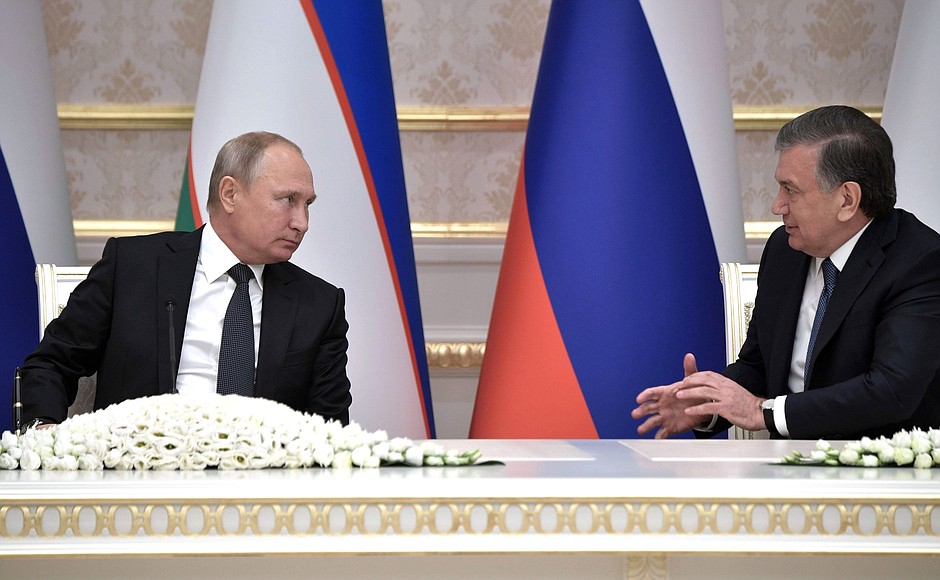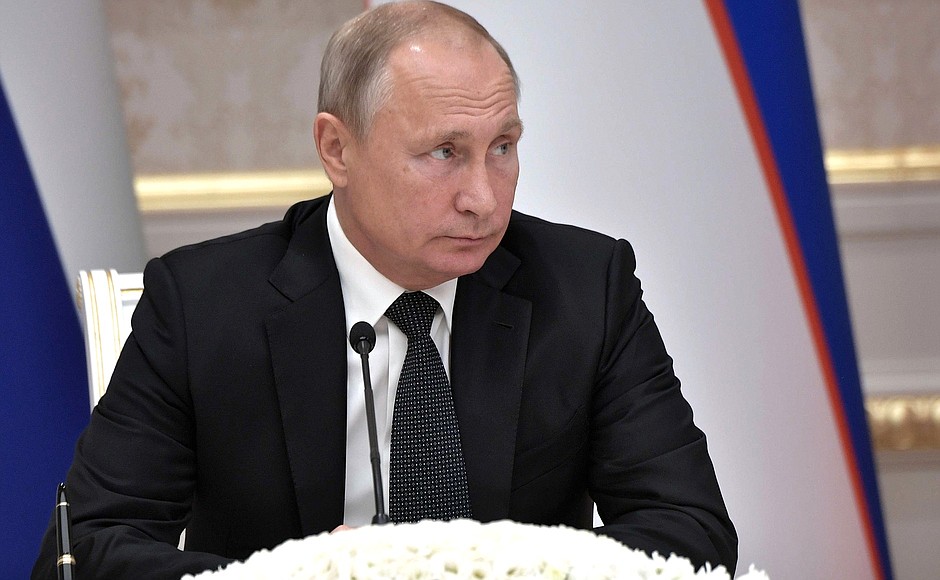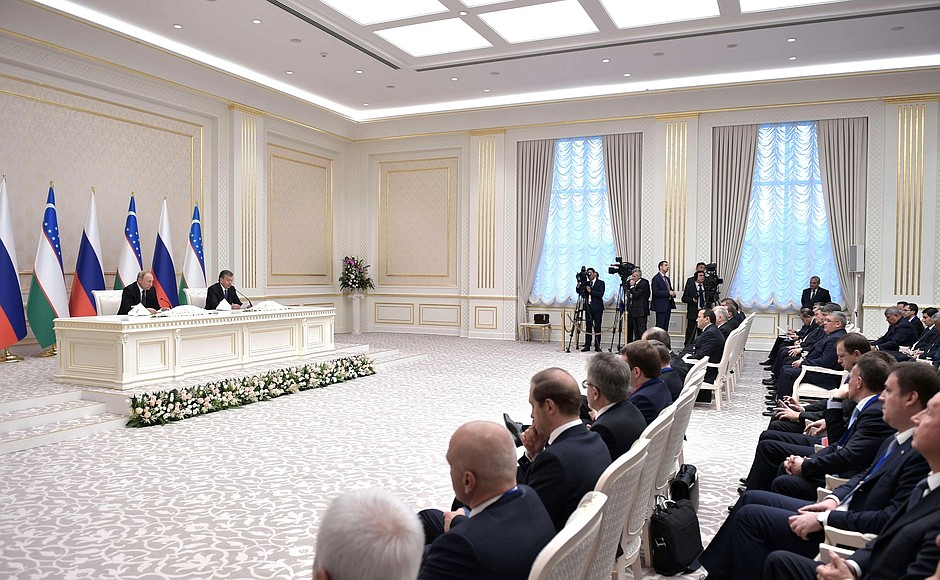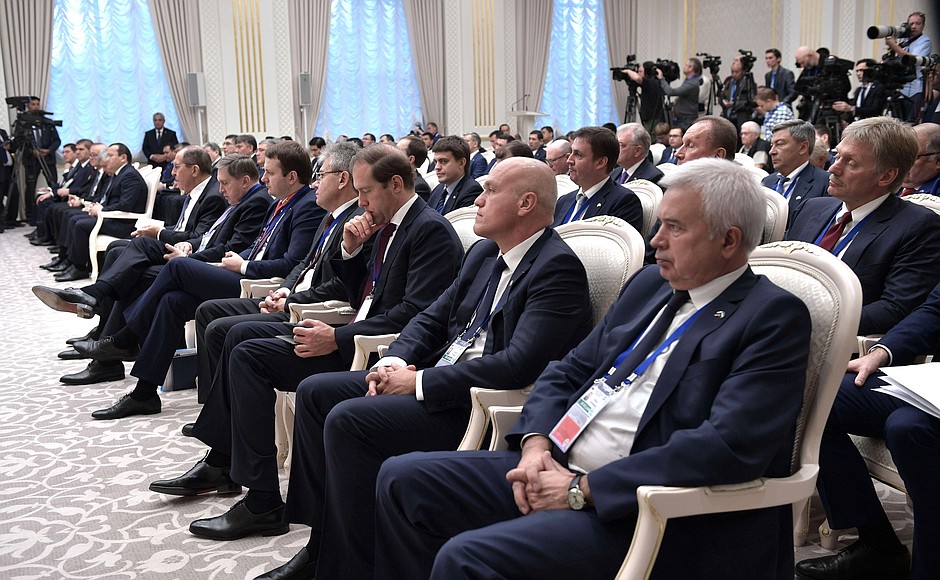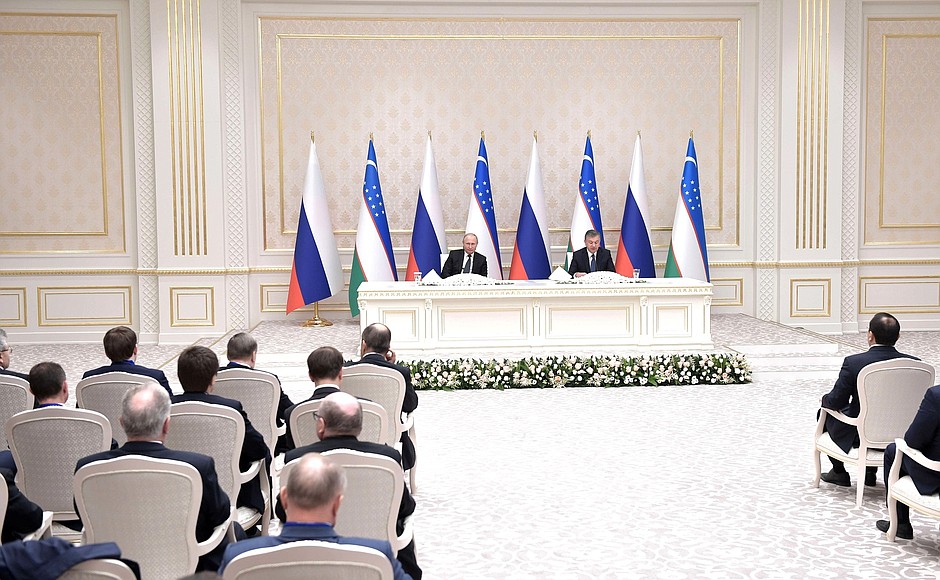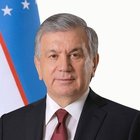President of Uzbekistan Shavkat Mirziyoyev: Mr President, ladies and gentlemen,
I heartily welcome you, Mr President, and our Russian friends to Uzbekistan. We in Uzbekistan are glad to see the Russian Federation’s tremendous achievements that have become possible above all thanks to the wise, far-sighted and assertive policy of such a prominent political leader of global stature as President Putin.
I want to express special appreciation to the President of the Russian Federation for his personal consistent efforts aimed at strengthening friendly ties and all-round cooperation between our states. Speaking of this, allow me on behalf of our country’s multiethnic people to thank you, Mr President, for erecting and unveiling a monument to the first President of Uzbekistan Islam Karimov in Moscow.
Our regular meetings and conversations with you have given a powerful impetus to the development of Russian-Uzbekistani cooperation, strategic partnership and alliance. Relations between our countries have reached a new level. This has been reaffirmed by the negotiations that were held as usual in a trust-based, open and constructive atmosphere. We have discussed the status of our bilateral cooperation and prospects for enhancing it.
Russia is Uzbekistan’s key trade partner. Since the beginning of this year, our trade has grown by 30 percent. We expect our mutual trade to reach up to $6 billion this year, and in the next few years, it will amount to $10 billion.
We are grateful to Russia for establishing the “green corridor” for delivering agricultural produce to Russia. We have agreed on extending this practice to other types of our products, including textiles. Russian investment in our economy exceeds $8.5 billion.
A set of new investment agreements and trade contracts with leading Russian companies and banks such as Gazprom, Gazprombank, LUKOIL, Rosatom, Forus and Vnesheconombank to the amount of about $25 billion have been drawn up.
We are interested in developing direct contacts between the regions of our two countries. Of major importance is the First Russia-Uzbekistan Interregional Cooperation Forum, which took place as part of this visit and resulted in cooperation projects to the tune of over $2 billion.
Today together with President Putin, we will launch a new strategic cooperation project – the first nuclear power station in Uzbekistan. Its construction will help develop the industrial potential and create new jobs in various economic sectors of our country.
Talks have reaffirmed the concurrence and proximity of our positions on topical regional and international issues. We will continue cooperation in the framework of the United Nations, the CIS, SCO and other reputable international and regional organisations.
Security issues will always be the focus of our attention. We have had a detailed discussion on coordinating our efforts in countering terrorism, extremism and especially radicalism among young people. We have also discussed military and military-technical cooperation from all points of view.
We focus on the development of cultural ties, above all in science, education, healthcare and tourism. The first joint educational forum, New Professionals for the New Economy, attended by 80 heads of leading Russian universities and held in Tashkent on the eve of your visit can serve as a good example. Over 100 agreements have been signed.
I would like to note that Uzbekistan ranks high among the CIS countries in the number of students it sends to Russian universities. This academic year, the Moscow Institute of Steel and Alloys has opened a branch in the Uzbekistani city of Almalyk to provide high-quality Russian education. We also plan to open branches of MGIMO, MEPhI National Research Nuclear University, the Russian State Cinema Institute, the Moscow Energy Institute and the Russian Chemical Technology University. This cooperation will continue.
We have agreed to promote cooperation in science. You have just seen a good example with your own eyes: we have signed a joint project to create a super-powerful radio telescope on the Suffa Plateau to develop space research. We discussed the implementation of this project with President Putin several months ago, and today we have agreed on the “road map.” I think perhaps an Uzbekistani citizen will be launched into space soon aboard a Russian spacecraft. In order to bring our people closer together, we have agreed to hold the fourth Russian-Uzbekistani youth forum in Uzbekistan.
I would like to raise another important topic. In order to properly celebrate the 75th anniversary of the Great Victory in 2020, we are preparing a special programme here in Uzbekistan. We plan to set up a Victory Park Complex in Tashkent. It will symbolyse our joint fight against Nazism and serve to teach the young generation respect for their history, patriotism and friendship between peoples.
The great Russian culture has always been and will always remain an integral part of the Uzbekistani people’s spiritual life. In order to get people, above all youth, acquainted with masterpieces of Russian literature, we plan to publish Russian classic masterpieces in 100 volumes in Uzbek.
Friends, I am confident that President Vladimir Putin’s state visit to Uzbekistan will give an impetus to the further development of comprehensive cooperation between our countries.
I am very pleased to give the floor to President of Russia Vladimir Putin.
President of Russia Vladimir Putin: Mr President, colleagues, friends,
The state visit to the Republic of Uzbekistan is being held in a truly friendly and very businesslike atmosphere, which is typical of Russian-Uzbekistani contacts at all levels.
The President of Uzbekistan and I have had constructive and exceptionally useful talks, examined in detail a wide range of issues related to bilateral cooperation and discussed topical international and regional matters. We will also have an opportunity to further discuss these topics with the President informally. We have outlined the key areas for developing our relations of alliance and strategic partnership.
All these matters are covered in the Joint Statement we have just signed. It includes clear guidelines for further work between ministries, agencies and organisations in order to deepen our cooperation.
We have also reached other important bilateral agreements and signed major commercial contracts.
Traditionally, talks have focused on issues related to economic development and cooperation in this area. Uzbekistan is Russia’s fourth biggest trading partner among the CIS countries. Trade and economic ties between our countries continue developing dynamically. Last year, bilateral trade grew by 34 percent, with another 32 percent added in the first six months of this year.
The volume of Russian investment in the Uzbekistani economy is almost $9 billion. But I believe this is just the beginning.
Over 1,000 enterprises with Russian participation are registered in Uzbekistan. The conditions President Mirziyoyev has created for Russian economic operators allow us to believe that these are also just the first steps in our joint work.
In order to give an additional boost to Russian-Uzbekistani cooperation, in the economy above all, Mr President and I have decided to establish a joint commission headed by the prime ministers. The commission will address strategic issues of economic, investment and technological cooperation.
Special attention should be paid to energy, where we have good prospects. First of all, Rosatom has a major project to build the first nuclear power station in Uzbekistan, as we agreed last year during Mr President’s state visit to Moscow.
Today, Mr President and I will launch this project’s implementation. In fact, this is not only about building a large industrial facility in Uzbekistan, but about creating a new industry, a new sector of the economy.
The power station’s two energy units with a total capacity of 2.4 MW will provide for cheap and clean electricity, which will be used by consumers in Uzbekistan and other Central Asian countries. This will promote energy stability in Uzbekistan and the entire region.
Let me stress that the most advanced technologies and efficient and reliable engineering solutions will be used in the construction of the nuclear power station, which will be carried out in compliance with the highest safety and environmental requirements.
Power Machines is also contributing to the development of Uzbekistan’ energy sector. The company is helping to upgrade the Syrdarya thermal power station and the Charvak hydroelectric power station. Our Uzbekistani partners were given detailed proposals regarding the development of a Central Asian energy network that would connect the energy systems of the region’s countries.
We have good cooperation experience in hydrocarbons extraction, processing and transporting. This April Lukoil commissioned the Kandym Gas Processing Complex, the largest gas processing facility in Uzbekistan with a capacity of 8.1 billion cubic metres per year. Gazprom purchased 5 billion cubic metres of Uzbekistani gas in 2017; it is developing the Shakhpakhty gas condensate field and conducting exploration work in the Ustyurt region of the country.
Let me note the steady development of bilateral industrial cooperation. Rostec and its Uzbekistani partners have established joint enterprises to produce helicopters, machines and medical equipment.
Rosselmash, Kamaz, Eurocement and other Russian companies are expanding their presence on the Uzbekistani market. Vympelcom is a leading mobile operator in the country with about 10 million users.
We have examined the prospects for cooperation in agriculture. In the first six months of the year, bilateral trade in agricultural produce grew by 30 percent, mostly due to the introduction of the “green corridor” system, which allows shipping agricultural products across our borders without any obstacles.
Agriculture is the main theme on the agenda of the first Interregional Cooperation Forum, which is underway in Tashkent. President Mirziyoyev and I plan to speak at the plenary session today.
The Russian delegation at the forum comprises representatives from 37 regions. The programme of the event includes seminars and panel discussions not only on the agro-industrial sector, but also on many other areas of bilateral contacts. The idea of such a joint gathering was proposed by Mr President, and we, of course, supported it.
The Russia-Uzbekistan Interregional Forum can become an annual event. Russia holds such interregional forums together with an entire range of CIS countries, and they bring good results both for the development of interregional cooperation and for bilateral relations in general.
We also discussed cultural cooperation and agreed to promote research and educational exchanges. These matters will be discussed at another joint forum, New Professionals for the New Economy, which is being held now in Tashkent.
By the way, Russian universities currently accommodate over 25,000 students from Uzbekistan. Branches of Lomonosov Moscow State University, the Plekhanov Academy and Gubkin University of Oil and Gas operate in the republic.
While discussing key regional topics, we noted a match or proximity of the positions of Russia and Uzbekistan. We agreed to continue foreign political coordination within the United Nations and other leading international organisations, as well as to cooperate closely within the CIS and the Shanghai Cooperation Organisation.
Our common interests include the normalisation of the situation in Afghanistan. Russia welcomes the active participation of Uzbekistan in facilitating the launch of the peace process. We consider it important to neutralise the threats coming from this country related to the spread of terrorism, drug trafficking and organised crime.
In conclusion, I would like to again thank Mr President and all our Uzbekistani friends and colleagues for the warm, hearty reception and useful and fruitful talks.
I think that Mr President due to his big heart somewhat overstated my contribution to history, but let me assure you that we will implement all our agreements. I am sure that it will benefit our interstate ties, will strengthen friendship between our peoples and, of course, will improve the well-being of our citizens.
Thank you.
